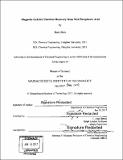Magnetic gels for uranium recovery from wet phosphoric acid
Author(s)
Chen, Ran, S.M. Massachusetts Institute of Technology
DownloadFull printable version (10.38Mb)
Other Contributors
Massachusetts Institute of Technology. Department of Chemical Engineering.
Advisor
T. Alan Hatton.
Terms of use
Metadata
Show full item recordAbstract
Incorporation of uranium recovery into wet phosphoric acid (WPA) processes can potentially supplement a significant portion of the world's uranium production and simultaneously benefit human health and environment by reducing radiological and toxic contamination of the phosphate fertilizer products. Liquid-liquid extraction as conventional uranium recovery methods applied in industrial suffers from various processing challenges, such as large consumption of combustible carriers, incomplete demulsification, interference with humic matters and crud formation. The aim of this thesis is to develop novel solid state gel-based materials suitable for recovery of uranium from industrial wet phosphoric acid. The materials developed can serve as the foundation of developing alternative processes to overcome limitations within liquid-liquid extraction for uranium recovery. Two types of materials -- magnetic organo-hydrogel and magnetic lyogel were developed and tested to be capable of extracting uranium selectively from the OCP phosphoric acid samples. The materials demonstrated sufficient structural stability, magnetic recoverability, similar uranium uptake performance as liquid-liquid extraction. Compared with magnetic organo-hydrogel, the lyogel exhibited reduced amount of extractant loss and better recyclability. Therefore, the magnetic lyogel can serve as the foundation on which novel uranium extraction processes to be designed in the future.
Description
Thesis: S.M., Massachusetts Institute of Technology, Department of Chemical Engineering, 2017. Cataloged from PDF version of thesis. Includes bibliographical references (pages 75-85).
Date issued
2017Department
Massachusetts Institute of Technology. Department of Chemical EngineeringPublisher
Massachusetts Institute of Technology
Keywords
Chemical Engineering.